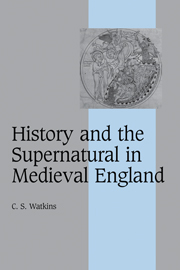Book contents
- Frontmatter
- Contents
- Preface
- Note on the text
- List of abbreviations
- INTRODUCTION
- Chapter 1 THINKING ABOUT THE SUPERNATURAL
- Chapter 2 INVENTING PAGANS
- Chapter 3 PRAYERS, SPELLS AND SAINTS
- Chapter 4 SPECIAL POWERS AND MAGICAL ARTS
- Chapter 5 IMAGINING THE DEAD
- Chapter 6 THINKING WITH THE SUPERNATURAL
- CONCLUSION
- Bibliography
- Index
- Cambridge Studies in Medieval Life and Thought Fourth Series
Chapter 3 - PRAYERS, SPELLS AND SAINTS
Published online by Cambridge University Press: 23 June 2009
- Frontmatter
- Contents
- Preface
- Note on the text
- List of abbreviations
- INTRODUCTION
- Chapter 1 THINKING ABOUT THE SUPERNATURAL
- Chapter 2 INVENTING PAGANS
- Chapter 3 PRAYERS, SPELLS AND SAINTS
- Chapter 4 SPECIAL POWERS AND MAGICAL ARTS
- Chapter 5 IMAGINING THE DEAD
- Chapter 6 THINKING WITH THE SUPERNATURAL
- CONCLUSION
- Bibliography
- Index
- Cambridge Studies in Medieval Life and Thought Fourth Series
Summary
As we have seen, the conversions witnessed not only a transformation of religious belief but also a ‘socialisation’ of the new religion as it became enmeshed in political and social practices. Wondrous, miracle-working Christianity waxed large in a system of belief which was, in many ways, profoundly worldly in its orientation. But the price of this Christianisation strategy was to reinforce the ancient tension comprehended within the faith between the needs of the body in this world and the needs of the soul in the next. In consequence, churchmen of a reformist temper worried through the early middle ages that beliefs and practices had been instrumentalised, turned into practical weapons against danger and misfortune. Alcuin gave voice to such fears, claiming that too many of the faithful would rather have holy things dangling round their necks as miraculous tokens against misfortune than carry them in their hearts in hope of salvation. Alcuin's alarm echoes through the eleventh, twelfth and thirteenth centuries. Hugh of Lincoln renewed the case against over-attachment to wondrous things when he attacked the veneration of a eucharistic wafer which had miraculously turned into flesh. He marvelled ‘why should we gape at a sensuous image of this divine gift when every day we behold by faith this heavenly sacrifice whole and entire?’ Gerald of Wales made the same essential point.
- Type
- Chapter
- Information
- History and the Supernatural in Medieval England , pp. 107 - 128Publisher: Cambridge University PressPrint publication year: 2007

